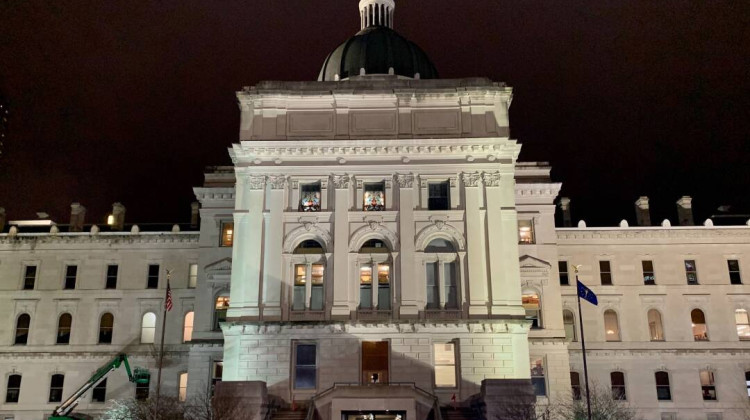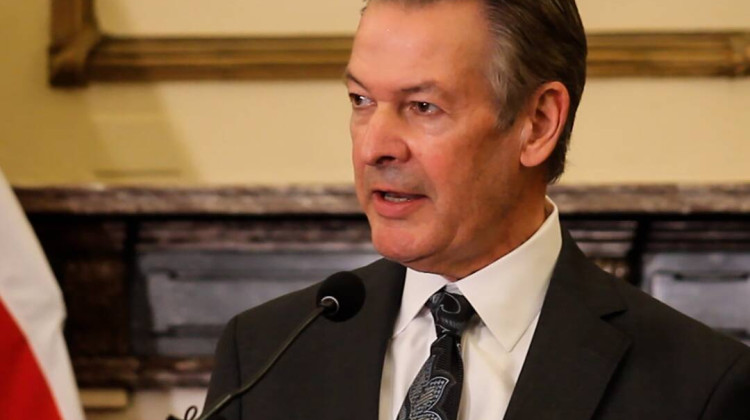
The Governor's Workforce Cabinet laid out challenges facing Indiana's workforce and recommended solutions to lawmakers in a report released Friday.
Lauren Chapman/IPB NewsThe future of Indiana's workforce faces a lot of threats: shrinking college enrollment, illiteracy, automation, and lack of child care or transportation access.
The Governor's Workforce Cabinet laid out those challenges and recommended solutions to lawmakers in a report released Friday.
The 30 recommendations aim to connect employers with qualified workers, ease employment barriers and build up the state's future workforce. They range pretty widely within those categories, from creating a system to automatically expunge records of criminal misdemeanors to creating a state “Talent Agency.”
The goal is to get lawmakers to consider the recommendations and potentially turn them into legislation for the 2023 legislative session.
“These are all priority ideas that can move the needle, they're all scalable, they can all be implemented with great speed,” said Whitney Ertel, cabinet executive director. “Each of these ideas are really fully researched, [cost estimates] have been put to a lot of them. We've also looked at the number of potential people that would be involved, and how many people would be helped by the various recommendations.”
The recommendations in the public report include less detail than Ertel described, but she said there’s “a lot of paperwork” behind them that will be presented to lawmakers and Gov. Eric Holcomb.
“Some of the recommendations are a little bolder than others. But again, we think it's what's required to really move the needle for Indiana,” she said.
The state “Talent Agency” recommendation, for example, would have the state create teams that would work with employers to address their workforce training and recruitment needs.
“The talent agency concept is really focusing on employers and what employers need,” Ertel said. “And we've done that in the past, but not to the degree that we're suggesting with the talent agency.”
The cabinet's 31 members include a high school principal, state officials, corporate executives and other community or educational leaders. They were separated into groups that developed certain parts of the recommendations, meaning they were not aware of and may not necessarily support everything in the final report.
“We know that there are people that want to work, but they might have barriers that are preventing them from doing so,” Ertel said. “So we think by removing some of these barriers, it just makes it easier for people to get the services they need and to either get more training and education or get into work.”
One example of a barrier the report's recommendations address is the availability and affordability of child care. The report suggests reducing the minimum age requirement for employees working in a child care center to 16 and increasing the income eligibility limit for families to get vouchers that help pay for child care. The current limit in Indiana is the strictest in the country.
There’s a heavy focus on education throughout the recommendations. Indiana’s college enrollment is declining and falling short of its 60 percent goal, making it harder to find qualified workers for jobs that require a degree.
To address that, the cabinet recommends requiring high school students to fill out federal financial aid forms before graduating. They also want the state to automatically enroll qualifying students in its 21st Century Scholars Program, which can cover up to four years of paid tuition, rather than requiring them to apply.
A few other recommendations aim to make college more affordable and accessible to students. For example, “stackable degree” programs are recommended because they allow students to earn smaller credentials on their way to a full degree, ensuring they don’t walk away empty-handed if they drop out in the middle of a program because “life gets in the way.”
The cabinet also recommends incentivizing colleges and universities to enroll more students in “key degree programs” determined by the state and adjust their funding based on how many of their students stay and work in Indiana after graduation.
READ MORE: Librarians want to help combat Indiana’s declining literacy rate
Join the conversation and sign up for the Indiana Two-Way. Text "Indiana" to 73224. Your comments and questions in response to our weekly text help us find the answers you need on statewide issues and throughout the legislative session.
The cabinet’s education recommendations reach far beyond post-secondary education.
“The literacy rate for our state, it's concerning,” Ertel said. “And we want to make sure it's not slipping. So making sure that all third graders can read by the end of their year is super, super important.”
One recommendation the cabinet gives to address that issue is the creation of a “Dolly Parton Library of Indiana” to boost pre-kindergarten educational development. The program mails “a high quality, age-appropriate book to all registered, birth to age 5 children, addressed to them, at no cost.” The program started in Sevier County, Tennessee, where the country singer grew up and has since expanded to 14 states and a few other countries.
The report also recommends a program that would give unemployed adults who didn’t receive a high school degree bonus payments on top of their regular unemployment benefits if they work toward getting a high school equivalency through Indiana Adult Education.
“Based on recent UI claims, there are thousands of unique UI claimants per month without a high school diploma or HSE,” according to the report. “Indiana has an opportunity to incentivize this population to earn their HSE and be equipped for additional workforce opportunities.”
The state’s workforce is also at risk of being left “in the digital dust” if it doesn’t act quickly to upgrade workers’ tech skills, Ertel wrote in the report's introduction. The Brookings Institution estimates about a third of the state’s jobs are “highly susceptible to automation — the highest share in the country.”
“We've got to teach people skills, making sure people are embracing digital development so that our employers have the services and help they need to transform their business so that they stay relevant and competitive,” she said.
The recommendations to address this issue include prioritizing grant funding for “STEM-based (includes digital and computer science focused) employer training programs.”
CORRECTION: A previous version of this story misspelled Whitney Ertel's last name on first reference.
Contact reporter Adam at arayes@wvpe.org or follow him on Twitter at @arayesIPB.
 DONATE
DONATE








 Support WFYI. We can't do it without you.
Support WFYI. We can't do it without you.